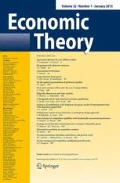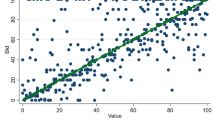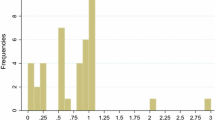Abstract
In this paper, we examine which auction format, first-price or second-price, a seller will choose when he can profitably cheat in a second price auction by observing all bids by possible buyers and submitting a shill bid as pretending to be a buyer. We model this choice of auction format in seller cheating as a signaling game in which the buyers may regard the selection of a second price auction by the seller as a signal that he is a shill bidder. By introducing trembling-hand perfectness as a refinement of signaling equilibrium, we find two possible strictly perfect signaling equilibria. One is a separating equilibrium in which a noncheating honest seller selects a first price auction and a cheating seller does a second price auction. In another pooling equilibrium, however, both cheating and non-cheating sellers select a second price auction. The conclusion that a seller chooses a second price auction even if he cannot cheat is in contrast to the previous literature, which focused on the case of independent values.
Similar content being viewed by others
References
Bag P.K., Dinlersoz E.M., Wang R. (2000) More on phantom bidding. Econ Theory 15: 701–707
Banks J.S., Sobel J. (1987). Equilibrium selection in signaling games. Econometrica 55: 647–663
Chakraborty I., Kosmopoulou G. (2004). Auctions with shill bidding. Econ Theory 24: 271–287
Cho I.K., Kreps D. (1987). Signaling games and stable equilibria. Q J Econ 102: 179–221
Graham D.A., Marshall R.C., Richard J.-F. (1990). Phantom bidding against heterogeneous bidders. Econ Lett 32: 13–17
Grossman S.J., Perry M. (1986). Sequential bargaining under asymmetric information. J Econ Theory 39: 97–119
Iwasaki A., Yokoo M., Terada K. (2005). A robust open ascending-price multi-unit auction protocol against false-name bids. Decis Support Syst 39(1): 23–39
Krishna V. (2002). Auction Theory. New York, Academic
McAfee R.P., McMillan J. (1987). Auctions and bidding. J Econ Lit 25: 699–738
Menezes F.M., Monteiro P.K. (2005). An Introduction to Auction Theory. Oxford, Oxford University Press
Milgrom P., Weber R. (1982). A theory of auctions and competitive bidding. Econometrica 50: 1089–1122
Myerson R. (1981). Optimal auction design. Math Oper Res 6: 58–73
Okada A. (1981). On stability of perfect equilibrium points. Int J Game Theory 10: 67–73
Porter R., Shoham Y. (2005). On cheating in sealed-bid auctions. Decis Support Syst 39: 41–54
Rothkopf M.H., Harstad R.M. (1995). Two models of bid-taker cheating in Vickrey auctions. J Bus 68: 257–267
Rothkopf M.H., Teisberg T.J., Kahn E.P. (1990). Why are Vickrey auctions rare?. J Polit Econ 98: 94–109
Selten R. (1975). Reexamination of the perfectness concept for equilibrium points in extensive games. Int J Game Theory 4: 25–55
Vickrey W. (1961). Counterspeculation, auctions, and competitive sealed tenders. J Finance 16(1): 8–37
Watanabe, T., Yamato, T.: Cheating in second price auctions with affiliated values. In: Proceedings of IEEE Pacific Rim International Workshop on Electronic Commerce 2006, (forthcoming) (2006)
Yokoo M., Sakurai Y., Matsubara S. (2001). Robust combinatorial auction protocol against false-name bids. Artif Intell J 130(2): 167–181
Yokoo M., Sakurai Y., Matsubara S. (2004). The effect of false-name bids in combinatorial auctions: new fraud in Internet auctions. Games Econ Behav 46(1): 174–188
Yokoo M., Sakurai Y., Matsubara S. (2005). Robust double auction protocol against false-name bids. Decis Support Syst 39(2): 241–252
Author information
Authors and Affiliations
Corresponding author
Additional information
We thank an anonymous referee for useful comments that have improved the paper. This research was partially supported by the Ministry of Education, Science, Sports and Culture, Grant-in-Aid for Scientific Research (B) 15310023 and (C) 18530139.
Rights and permissions
About this article
Cite this article
Watanabe, T., Yamato, T. A choice of auction format in seller cheating: a signaling game analysis. Economic Theory 36, 57–80 (2008). https://doi.org/10.1007/s00199-007-0262-3
Received:
Revised:
Published:
Issue Date:
DOI: https://doi.org/10.1007/s00199-007-0262-3




